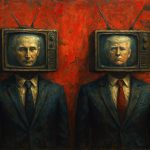J.D. Vance se convierte en el protagonista de su propia mitología conspirativa horas después de reunirse con un papa moribundo
J.D. Vance construyó su carrera política sobre la sospecha, el espectáculo y la manipulación. Ascendió entre las filas del movimiento MAGA no por ofrecer soluciones, sino por avivar la desconfianza hacia la prensa, el gobierno, las elecciones, los inmigrantes y cualquier persona que no estuviera ya de su lado. Y ahora, en un giro que parece sacado de las mismas pesadillas febriles que él mismo ha ayudado a propagar, se encuentra en el centro de una teoría conspirativa. No es una que él haya iniciado, pero sí una que se ha ganado. El papa Francisco murió el 21 de...
Read More














